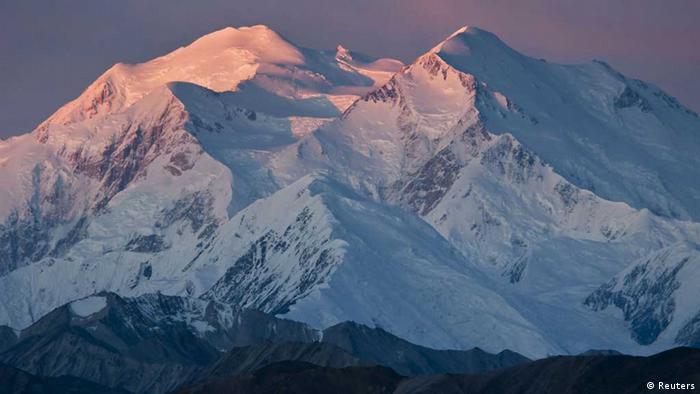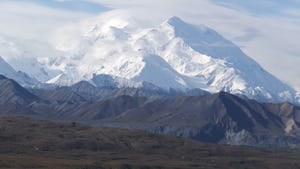還我本色:北美最高峰更名“德納里”
就在美國總統奧巴馬造訪阿拉斯加州前夕,位於當地、全北美最高的山正式由麥金利山更名為德納里峰,恢復了原住民對這座高山的慣稱。
(德國之聲中文網)美國白宮於週日(30日)發表聲明稱,由阿拉斯加州1975年發起的正名程序終於有了定案,北美最高山將由“麥金利山”正式(Mount McKinley)改名為“德納里峰”(Mount Denali)。
在阿拉斯加原住民的語言中,“德納里”指的就是“高峰”(The High One),當地人一直以此名稱呼它。直到1896年,這座山被定名為“麥金利山”,以紀念1901年被槍殺的美國第25名總統威廉·麥金利(William McKinley)。不過,麥金利自己從來也沒有到過當地。
阿拉斯加州自70年代起已經開始爭取恢復這座山的原稱。因此這次改名,可以說是尊重了原住民的意見,結束了40年的名稱爭議。
德納里峰山以6168米的高度號稱全北美最高峰,順理成章地,它亦名列於世界7大洲最高峰(Seven Summits)之一。那兒天氣極端惡劣,強風及低至零下70度的溫度亦令這座山難以攀登。
阿拉斯加與氣候變化
就在更名後翌日,奧巴馬已於週一(31日)抵達阿拉斯加州,並將在當地逗留三天作視察。他早前曾表示,部分位於北極圈內的阿拉斯加的居民已經感覺到 氣候變化的後果。他此行將會詢問當地人氣候變化有否影響他們的生活,並將在安克雷奇(Anchorage)與多國外長共同參加北極地區會議。
透過此行,奧巴馬同時成為了第一位在任內造訪 阿拉斯加北極圈(Alaskan Arctic)的美國總統。
Ohio delegation blasts Mount McKinley name change
 Gregory Korte, USA TODAY8:53 p.m. EDT August 31, 2015
Gregory Korte, USA TODAY8:53 p.m. EDT August 31, 2015President Obama will officially change Mount McKinley's name back to Denali. Here are 5 things to know about the 20,237-foot mountain. USA TODAY
WASHINGTON — When it comes to getting around Congress, President Obama may not be able to move mountains — but he can rename them.
The Obama administration's decision to rename North America's tallest peak to its original native name of Denali is drawing protests from Republican lawmakers in Ohio.
That's because the mountain's previous namesake, President William McKinley, was also a Republican from Ohio.
"This decision by the administration is yet another example of the President going around Congress," Sen. Rob Portman, R-Ohio, said, noting that Congress had been debating the name for years.
Ohio Gov. John Kasich, a Republican presidential candidate, said Obama "overstepped his bounds."
Rep. Bob Gibbs, R-Ohio, went even further, calling it another example of Obama's "constitutional overreach."
"President Obama has decided to ignore an act of Congress in unilaterally renaming Mount McKinley in order to promote his job-killing war on energy," Gibbs said in a tweeted statement Sunday. "This political stunt is insulting to all Ohioans."
Obama timed the announcement to coincide with a three-day trip to Alaska to highlight the problem of climate change in the Arctic. But the dispute over the name goes back decades.
The 20,237-foot mountain was originally known as Denali, which means "the great one" in the Athabascan language of the original Alaskans. But that began to change when European-American prospectors and explorers arrived. A Seattle man, William Dickey,rediscovered the mountain in 1896 while prospecting for gold.
"We named our great peak Mount McKinley, after William McKinley of Ohio, who had been nominated for the presidency,and that fact was the first news we received on our way out of that wonderful wilderness," he wrote in a dispatch to the New York Sun.
McKinley was not yet president then, and the naming may have been a political stunt in itself: McKinley, in running against the populist Democrat William Jennings Bryan, favored the gold standard to back U.S. dollars.
That name was formalized in 1917 when President Woodrow Wilson signed the Mount McKinley National Park Act, which required the park to be "dedicated and set apart as a public park for the benefit and enjoyment of the people under the name of the Mount McKinley National Park."
But another law passed in 1947 gives the Secretary of the Interior and the Board on Geographic Names the power to "provide for uniformity in geographic nomenclature and orthography throughout the federal government."
The Alaska government first petitioned the Interior Department to change the name to Denali in 1975. But because the Board on Geographic Names deferred to Congress if a name was under consideration by lawmakers, the Ohio delegation was able to prevent a name change for four decades simply by introducing bills to keep the McKinley name — even if those bills never passed.
Friday, Interior Secretary Sally Jewell said that impasse had gone on long enough. In her order issued Friday, she noted that McKinley never stepped foot in Alaska.
Still, House Speaker John Boehner, who hails from the opposite corner of Ohio, said he was "disappointed" in the decision.
"There is a reason President McKinley’s name has served atop the highest peak in North America for more than 100 years, and that is because it is a testament to his great legacy," Boehner said in a statement.
He recited McKinley's record, which included service in the Union Army in the Civil War, elections to the House of Representatives and to the Ohio governorship. "And he led this nation to prosperity and victory in the Spanish-American War as the 25th President of the United States," Boehner said.
It's unclear what the Ohioans can do about the decision. Gibbs said he would would work to overturn the decision legislatively; Portman said he would ask the National Park Service to find a way to "preserve McKinley's legacy somewhere else in the national park that once bore his name."
The issue is not strictly a partisan one. Ohio Democrats, too, have introduced bills over the years to retain the McKinley name.
And Sen. Lisa Murkowski, R-Alaska — while critical of Obama on energy policy — praised the decision to rename the mountain. “For centuries, Alaskans have known this majestic mountain as the ‘great one,’" she said in a statement Sunday. "I’d like to thank the President for working with us to achieve this significant change to show honor, respect, and gratitude to the Athabascan people of Alaska."


沒有留言:
張貼留言